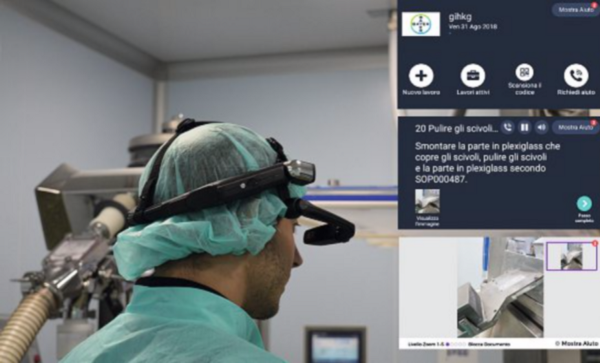Bayer’s pharmaceuticals division, like units of most big corporations, generates lots of data but, until recently, managed to leverage only a small amount of it. Thanks to a pilot project — part of the company’s Advancing Digital transformation initiative — it’s making better use of data, and its plant in Garbagnate, Italy has become a “lighthouse” factory teaching others how to do the same.
The plant, which produces and packages pills, was named one of the most advanced factories in the world in September by the World Economic Forum and McKinsey. Nine factories were recognized for their strides toward embedding the technologies of the Fourth Industrial Revolution into modern production, improving operational performance in the process. The Garbagnate pilot, which was launched in September 2017, uses machine learning and analytics to increase operational efficiency, a digital twin (digital replica technology) for employee laboratory scheduling, and augmented reality (AR) devices to reduce changeover times when switching product lines. In each case the front-end applications are connected to 15 data sources and integrated into the plant’s IT infrastructure. Ongoing operations are now more transparent to employees on the factory floor and they get real-time updates on performance, helping them make smarter decisions, react faster and utilize resources more efficiently, says Hans-Walter Hoehl, head of efficiency, innovation and projects within the product supply unit at Bayer’s pharmaceuticals division.
“The first results are very promising,” says Hoehl. “In certain areas, such as coating tablets, we could further optimize the manufacturing process and eliminate root causes for potential variations.Bayer’s pharmaceuticals division plans to roll out the digital initiatives to other major sites in the near future. And, it has agreed to share what it has learned with other manufacturing businesses, to aid the adoption of technologies, as part of a new program launched by the World Economic Forum. The aim of the program is to build a network of the most advanced manufacturers to address problems confronting industries when they invest in advanced technologies. Earlier work by the Forum found that over 70% of companies do not take pilots beyond the implementation stage due to unsuccessful implementation strategies. Digitizing factories goes far beyond implementing technology. “When there is much more available data it also requires a change in the culture of decision-making,” says Hoehl.
Making the Most of Data
Data scientists played a key role in digitizing Bayer Pharmaceuticals’ plant by developing the algorithms that turn data into useful insights to enable more efficient production of drugs. Three steps were required to develop the algorithms. First, the data had to be prepared: different data sources need to be “cleaned” and connected to be applicable for advanced analytics. Next, the algorithms had to be set up through a modeling process. Different machine learning techniques were implemented to enable the algorithms to make predictions. Finally, the company needed to figure out how to visualize the insights in ways that employees on the factory floor could interpret easily.
That is where technologies like the digital twin come in. A machine learning-powered digital replica of a laboratory now takes care of employee scheduling to maximize efficiency. “Output increased by 40% and people love it because it makes their work better and easier,” says Hoehl. “We want to make this readily available to labs across the whole network.” AR, another visualization tool, is helping significantly reduce the time it usually takes to change from producing one product to another, increasing the utilization of factory machines, says Hoehl. Not only was the production time reduced but employees no longer have to follow lengthy, complicated paper-based instructions, he says. That is not to say that digitizing a factory is without challenges. Structuring the data and putting the necessary connectivity in place is a lengthy process but competition for skilled data scientists is fierce. Digital transformation also requires lots of employee training. Internal experts on quality control, packaging and engineering need to be an integral part of the process and managers must learn to make decisions based on data rather than on prior experience only. Hoehl’s advice to factories embarking on a digital journey? “Start by designing use cases for the technology and then select a partner that can help you rather than trying to do everything on your own.”







